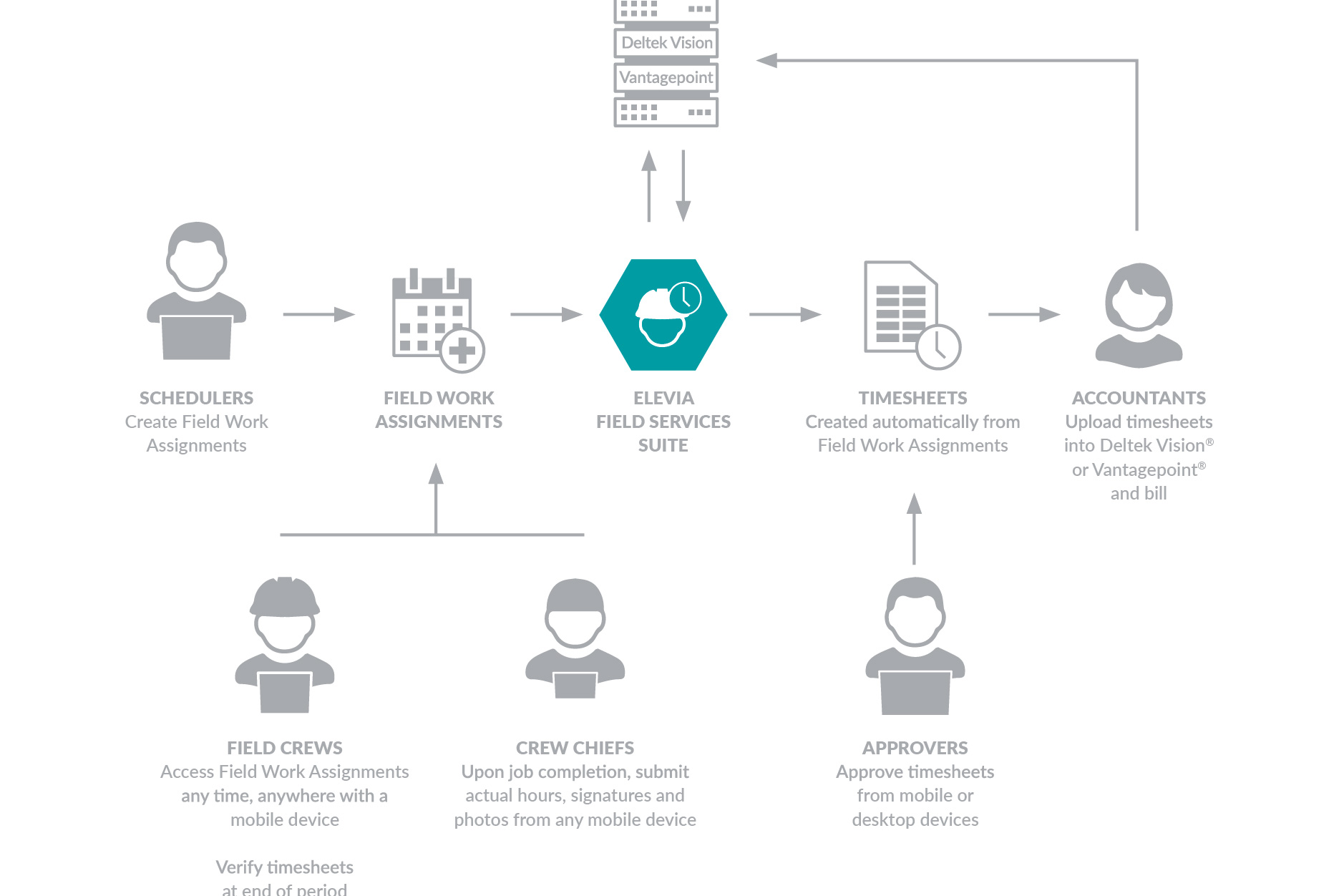Story at a glance:
- Elevia’s Field Services Suite(FSS) module ensures everyone from the field to the office has the most up-to-date information in real time.
- Time sheets, billing, and approvals all flow into Deltek Vision or Vantagepoint, where they are automatically reconciled. This eliminates manual work load and the errors associated with duplicate data entry.
With more than 200,000 licensed users in 50 states and more than 40 countries, EleVia Software has grown tremendously since its founding in 2009. Serving the AEC sector (specifically companies that use Deltek Vision and Vantagepoint ERP systems), the Minneapolis-based firm aims to “elevate and enhance key financial and operational processes—giving you valuable insight into project performance and profitability.”
“Our flagship product EleVia Electronic Invoicing allows firms to bill faster and improve cash flow by providing billers and project managers a simplified and intuitive electronic process to mark up and approve draft invoices,” says Bob Stach, EleVia’s western region sales director. “Since 2009 we have introduced software that automates and improves other accounting functions like payables and collections. We are excited to bring the same level of automation to another area of our customer’s business—namely their field operations.”
Stach recently spoke with gb&d about EleVia’s Field Services Suite (FSS) product and how it works.
How does EleVia’s FSS software help companies enhance their performance?
The Field Services Suite module touches all the aspects of field operations. You have teams working in the field, crew chiefs, project managers, schedulers, and billers who are all involved in the process. FSS makes everyone’s lives easier by optimizing and automating processes that flow right into your Deltek Vision or Vantagepoint ERP system.
Everything in FSS is in real time, allowing you to be agile with your field operations. For example, if a field assignment changes because the ground is too frozen on site A, you can switch someone to site B in FSS and they will immediately receive a notification on their mobile device with the new assignment. All the information you need for your new assignment on site B is pulled into FSS from your ERP and easily accessible for your crews. You’re not re-creating the wheel every time things change; you can dynamically react to changes with the information at everyone’s fingertips.
Who primarily uses EleVia’s software?
Initially designed for engineering companies with field operations, FSS is now used across industries that utilize Deltek as their ERP—soil engineers, bioengineers, inspection services, and construction management are a few. We have customers with different project types; sometimes customers have different project types in the same firm. The larger and more complex your organization, the more difficult it is to manage from a productivity perspective, and the more room there is for costly errors.
How does the software organize product data?

Image courtesy of EleVia
In the Deltek ERP system there’s project information. But how do all of the people who touch that information get to it? It‘s configured by how they do their jobs. For example, a field worker receives a notification on their mobile device because that’s their primary source of information outside the office. If I’m a PM or a scheduler, I see all the project information in a Gantt chart that looks a lot like Microsoft Outlook. I can also organize people, drones, or ATVs to be at an inspection site. My data is organized and centralized for easy scheduling.
FSS also includes mapping technology, which ties into Google Earth and utilizes its coordinates. So if I’m the field worker and I need to know where to go, that data is organized for how I need to see it, what I’m supposed to do, what I need to bring, the hours required, and what equipment is required. Everything is tied to the project records in the ERP, keeping the process accurate and efficient.
A big part of it, too, is how you bill for that equipment. Maybe you charge for a drone or GPS-enabled surveying equipment. I can easily input my usage data, so now my timesheet that’s ultimately related to how I’m billing gets filled out automatically and flows through the system. That way my PM can approve the time and equipment usage, and then the biller can see that, and it reconciles right into the billing system so there’s no need to re-key that data.
What’s the overall impact of implementing EleVia’s FSS?
Paper is still big in this industry, and there’s not a great system that ties into your ERP to automate these manual processes. As a PM, now all of the information—the timesheets, what’s to be billed on a project, and the approval—all flow into the system so it can be reconciled into an invoice quite easily while avoiding errors. Additionally, many companies have expensive equipment that isn’t managed well. Was a drone used on a specific job? If so, how do they amortize the use in the field? Or maybe they don’t bill for it, but they still need to track the hours of usage. And that’s all part of the information flow.
Another feature we added has to do with expertise. Maybe I have a guy whose specialty is surveying, but he’s also on this project happening elsewhere that needs a surveyor. I can see which team member of my crew are qualified to survey and where they’re working at any given moment. I can see which team member is closest to the site that needs assistance and automatically update their assignment to go there
Improving utilization by even 1% can have significant impacts on a firm’s profitability. By using FSS to schedule strategically, firms can take on more billable work. If you can better see your schedule and alter it, you can adapt to changes and maximize your utilization.
Are there specific challenges you deal with when explaining the software to potential customers?
Yes. Sometimes you’ll talk to people who are in the field and say, “We could never part with paper; that’s just how our business works. Our fieldwork assignments are paper, and we have to have the customers sign off on things.” With FSS, that can be done digitally, and we generate forms customers can sign right on a phone or tablet.
And if you ask people how they deploy their field workers, you learn that some come in every morning to a central site, and assignments are on a whiteboard. Think of the efficiency related to the mere act of coming in. Wouldn’t it be better to go to a location directly from your house? Savings in time, fuel, and equipment use can impact the bottom line.
There’s also the potential for job assignment errors when dealing with paper instead of doing things electronically because the process isn’t transparent to everyone involved. The potential for miscommunication is always there if you’re not doing things electronically. Maybe a site address is wrong, or billing information is incorrectly input. The nice thing about organized data coming out of your ERP system in real time is that you don’t have several people manually writing down information that already exists. Miscommunication costs money. If someone is mistakenly sent out to the wrong job site, you’re paying for their wasted time as well as losing money on unneeded equipment. Optimizing utilization rates of personnel and equipment by minimizing errors is vital.
Any real-life field examples you can share?
There was this company in Canada that wanted to get their people to the job they were supposed to be on with the best real-time information. EleVia provided that. After they started using it they told us, “I can’t tell you how many times we’ve scheduled a field crew to a faraway site and found they couldn’t work on because of weather or other factors that suddenly change.” As a result they had to send them somewhere else, which meant lost time. That benefit alone—improving their utilization rate—justified the cost of the software.


